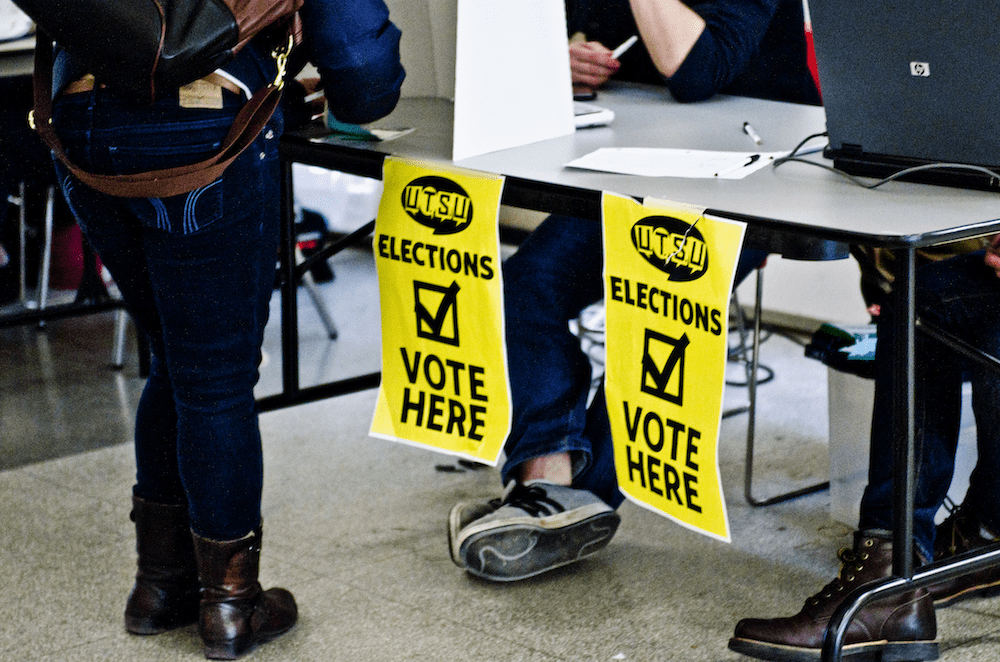Critics of the utsu continue to call for electoral reform at the University of Toronto Students’ Union. The reforms proposed by these students claim to address four problems within the union: low voter turnout at utsu elections; a perception of bias or irregularity within the electoral process; the fact that the executive elections are consistently won by slates made up at least partly of existing executives; and the alleged unfairness of proxy voting at both the Annual General Meeting (agm) and utsu board meeting.
Opposition members want the union to address these concerns through electoral reform. However, some of their complaints are not justified and not all of their solutions are likely to be effective. The opposition proposes online voting to increase voter turnout and improve the image of the electoral process; a change in the way the Chief Returning Officer is appointed to improve accountability; and the elimination of proxy voting at the agm, Board Meetings, and Committee Meetings in order to avoid one side collecting too many proxies.
Low voter turnout at utsu elections is unfortunate, but unsurprising. U of T has a significant commuter population and a smaller proportion of students living in residence than many other southern Ontario universities. Commuting students face more barriers to participating in campus life generally and student politics specifically than their residence counterparts; thus they are less likely to get involved and vote. Furthermore, U of T has a reputation for both academic excellence and a poor social scene. Consequently, those who choose to attend U of T tend to be those who wish to prioritize their schoolwork. It has not been demonstrated that low voter turnout is a reflection of disgust with utsu. Rather, it seems consistent with the different priorities that the
U of T student body has. The opposition claims that online voting will solve this problem. Internet voting has garnered some attention in academic literature in recent years. While the full story is complex, conclusive evidence has yet to be produced that demonstrates the efficacy of online voting as a means of improving voter turnout and engagement.
Despite repeated accusations of electoral irregularities, no one has provided substantive or credible evidence that vote tampering has occurred. The electoral process allows for each candidate to appoint scrutineers to oversee the count on their behalf and accompany the ballot boxes to their storage locations. This is the same system that Elections Canada (ec) uses. There are regularly accusations of various minor rule infractions during each year’s executive campaign. However, they apply equally to both the incumbent and opposition slates. It is unfortunate that petty infractions, name-calling, and misrepresentations are the norm in student politics, but they are also the norm in politics in our society. People feel strongly about these issues and they are unlikely to always be completely honest, fair minded, and respectful.
The Elections and Referenda Committee (erc) appoints the Chief Returning Officer (cro). Three members of the utsu board of directors and three members of the executive constitute this committee. While some argue election review needs to be done by arms-length individuals, the presently formed arms-length Election and Reforms Appeals Committee (erac) has been criticized because it is made up of non-UTSU members. The same problem exists with the ec — Parliament appoints the head of the ec. Having the university administration choose the cro would not work because the administration is not a disinterested party in student politics. Moving the choice from the erc to the full board of directors may help, but it does not remove the fundamental problem.
Although slates led by sitting executive members have consistently won elections, this is insufficient to demonstrate electoral corruption. Many Canadian provinces have had electoral dynasties lasting for decades without any allegations of corruption. In a democracy, one political party may consistently perform to the satisfaction of a majority of its constituents and be repeatedly re-elected.
The issue of proxy voting has also been touched on in recent discussions. Proxy voting occurs at two levels: the agm, and both Board of Directors Meetings and committee meetings where the committees are made up of board members. Proxy voting at the agm is essential. A sizable chunk of utsu’s constituents are not located on the St. George campus, be it because they are commuters or because they attend U of T Mississauga. Removing proxies limits these people’s ability to participate and have their voices heard in the student union. Removing proxies at board and committee meetings is ridiculous. Board members are elected to represent their constituents. If they cannot attend 100 per cent of the meetings, that does not mean they should not be voting on behalf of their constituents. If some board members are failing to attend enough meetings, the solution is minimum attendance requirements for board members.
In short, democracy can be a messy business — but it has not been demonstrated that the current utsu executive or the electoral process is inherently corrupt. Although online voting merits further examination, the proposed reforms are largely ill-considered and counter-productive.
Denys Robinson studies philosophy.


